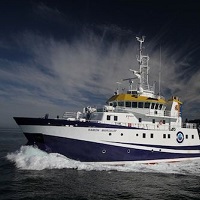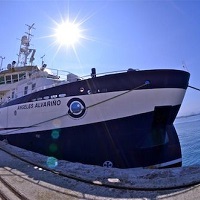Keyword
gas chromatograph mass spectrometers
14 record(s)
Type of resources
Categories
Topics
INSPIRE themes
Keywords
Contact for the resource
Provided by
Years
Formats
Status
-

The objective of this campaign is the sampling of sediments. These sediments will be used to assess the organic and inorganic pollutants in the marine area, as well as the possible biological effects of contaminants. In this survey, along with the traditional pollutants, the presence of microplastics in sediments will also be evaluated.
-

The campaign is part of the BASEMAN project (Establishment of protocols and references for the analysis of microplastics in European waters) of the PCIN within the specific JPI-Oceans call. The main objective is collecting samples of microplastics in water and sediments for studies of the spatial and temporal distribution of associated pollutants, as well as to evaluate the differences between the different sampling systems. In each of the stations a CTD will be made to know the thermohaline conditions.
-
The impact of trawling activity on a highly vulnerable habitat: the facies of Isidella elongata, a characteristic facies of Mediterranean deep sea communities, which is surprisingly a poorly known ecosystem.
-

TAlPro-2016 represents the Western Mediterranean basin component of the MedSHIP initiative. The cruise will occupy two meridional sections, one across the relatively flat and deep Algero-Provencal basin, and one across the deep and rugged Tyrrhenian Sea. The data collected during these sections will allow to: 1) measure the changes in the thermohaline properties of Mediterranean water masses at the basin-scale; 2) quantify the Dissolved Inorganic Carbon (DIC) storage in the Western Mediterranean Sea; 3) quantify the uptake of anthropogenic carbon in the Western Mediterranean Sea; 4) quantify changes in the ventilation of the deep and intermediate water masses thanks to the transient tracers (CFCs and SF6).
-

Study the role of B vitamins on the community structure, activity and succesion of the microbial plankton in a coastal upwelling system.
-

Study the role of B vitamins on the community structure, activity and succesion of the microbial plankton in a coastal upwelling system.
-

Study the role of B vitamins on the community structure, activity and succesion of the microbial plankton in a coastal upwelling system.
-

The scientific objectives of the cruise include the characterization of thermohaline fields, hydrodynamics, biogeochemistry and complementary biological measuremens in Atlantic Galician waters in a transect westwards from Finisterre surpassing the Galician Bank to the interior of the Iberian Basin, covering the entire water column to about 5,000 m deep. The cruise is part of a series that begun in 2003
-

The scientific objectives of the cruise include the characterization of thermohaline fields, hydrodynamics, biogeochemistry and complementary biological measuremens in Atlantic Galician waters in a transect westwards from Finisterre surpassing the Galician Bank to the interior of the Iberian Basin, covering the entire water column to about 5,000 m deep. The cruise is part of a series that begun in 2003
-

SCAPA will investigate the structural and dynamic attributes of the planktonic system in the Cantabrian Sea. This scientific objective will be in turn the base for a critical testing of the plankton indicators proposed by the Marine Strategy Framework Directive (MSFD) and for the development of new alternatives if necessary. SCAPA will carry out a crossed comparative approach enclosing the main modes of plankton variability; i.e. shelf, slope and oceanic waters with vertical resolution at seasonal and circadian time scales. It will study all planktonic components, from viruses to macrozooplankton at several organization levels (species, functional groups and trophic level), including also non-living organic matter derived from their activity (i.e. dissolved organic matter, aggregates and phaecal pellets). It will quantify production and biomass ratios across these organization levels and organic matter pools, specifically measure bacterial and primary production and downward fluxes (vertical migration and sediment traps) to diagnose food web structure and trophic pathways. SCAPA will focus on several aspects currently identified to present a deficit of information: seasonal variability in the oceanic domain (critical to implement indicators), the role of macroplankton (mainly at slope and oceanic domains) and microphagous gelatinous zooplankton, add on scarcely studied plankton vertical migration and quantification and quality of sinking biogenic material. The methodological approach takes advantage of the ongoing monitoring program RADIALES and will increase sampling effort to resolve vertical and circadian resolution at four times during the seasonal cycle. It includes a series of methodologies and techniques (e.g. flow cytometry, HPLC, plankton image analysis and automated classification) that are particularly efficient in sample time processing; a critical aspect for implementing plankton indicators, which have to be obtained by robust methodologies with reasonable costs and at operational temporal scales. SCAPA approaches the societal challenge of an ecosystem-based marine management, explicit in the European MSFD. Management actions related with the marine environment (e.g.: Fisheries) require implementing a series of indicators that resume the main structural and dynamic attributes of the plankton system. The latter is challenged, however, by the high complexity of the structure and dynamics of this system. Resolving this complexity is the main scientific objective of SCAPA. The development of indicators in marine ecology is in its founding state, although recently fostered by the MSFD.
 Catálogo de datos del IEO
Catálogo de datos del IEO